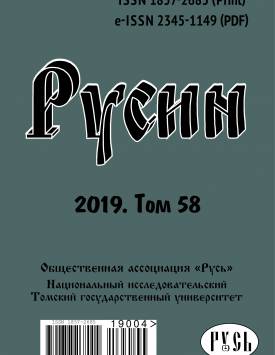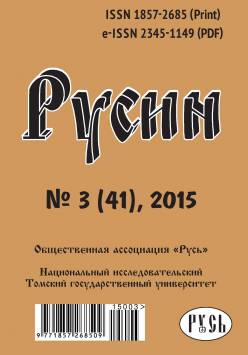The ideas of nationalism and Yugoslavism in Serbian political discourse
The article identifies the main direction of the national construction strategy in the former centre of the SFRY - Serbia. The authors show the dynamics of national construction, as well as various political positions on this issue. The emergence of new states after the Yugoslavian collapse actualised the contradictions in the national community interpretations. On the one hand, the ideas of Yugoslavism inherited by Serbs imply the formation of a supranational Yugoslav identity; while on the other hand, since the end of the 20th century the gradually enhancing anti-European rhetoric has been contrivuting much to the nationalist discourse. The paper inctroduces a series of structural and historical factors determining the popularity of nationalist ideas: problems with border delimitation, disagreements over state-forming issues, imperial and communist institutional heritage, tragic events associated with the collapse of Yugoslavia, etc. The authors analyse the phenomenon of Yugostalgia, reveal its causes and conclude that nationalist ideas in Serbia partly serve as a tool for consolidating the nation, while the course towards integration with the European Union has smoothed out, but not excluded the nationalist rhetoric of public politicians. In turn, the unpopularity of alternative ideas of Yugostalgia and Yugoslavism in politics are caused by the people's disbelief in the possible restoration of the Yugoslav Republic, rejection of communist ideas, and interethnic contradictions that have intensified after the collapse of Socialist Yugoslavia.
Keywords
Сербия,
югоностальгия,
югославизм,
национализм,
политический дискурс,
Serbia,
Yugostalgia,
Yugoslavism,
nationalism,
political discourseAuthors
| Meleshkina Elena Yu. | Institute of Scientific Information for Social Sciences of the Russian Academy of Sciences | elenameleshkina@yandex.ru |
| Pomiguev Ilya A. | Financial University under the Government of the Russian Federation; Institute of Scientific Information for Social Sciences of the Russian Academy of Sciences | pomilya@mail.ru |
Всего: 2
References
Velikonja M. Titostalgia: A study of nostalgia for Josip Broz. Ljubljana: Peace Institute, 2008. 146 p.
Velikonja M. Lost in transition // East European politics and societies. 2009. Vol. 23, № 4. P. 535-551.
Velikonja M. ROCK’N’RETRO. Novi jugoslavizam u savremenoj slovenačkoj popularnoj muzici // Nebeska Jugoslavija. Interakcije političkih mitologia i pop-kulture / Ed. by V. Perica, M. Velikonja. Beograd: Biblioteka XX vek, 2012. P. 67-171.
Stojanović D. Noga u vratima: prilozi za političku biografiju Biblioteke XX vek. Beograd: Bibl. XX vek, 2011. 296 s.
Tomić Đ. On the ‘right’ side? The Radical Right in the Post-Yugoslav Area and the Serbian Case // Fascism. 2013. № 2. P. 94-114.
Trošt T.P. Remembering the good: сonstructing the nation through joyful memories in school textbooks in the former Yugoslavia // Memory Studies. 2019. Vol. 12 (1). P. 27-45. https://doi.org/10.1177/1750698018811986
Steflja I. Internationalised justice and democratisation: how international tribunals can empower non-reformists // Third World Quarterly. 2018. Vol. 39, is. 9. P. 1675-1691. https://doi.org/10.1080/01436597.2018.1447370
Spasić I. Kultura na delu. Društvena transformacija Srbije iz burdijeovske perspective. Beograd: Fabrika knjiga, 2013. 318 p.
Попис становништва, домаћинства и станова 2011. у Републици Србији. Етноконфесионални и језички мозаик Србије / В. Ђурић, Д. Танасковић, Д. Вукмировић, П. ЛаЂевић. Београд: Републички завод за статистику, 2014. 207 с.
Рavković А. From Yugoslavism to Serbism: The Serb National Idea 1986-1996 // Nations and Nationalism. 1998. № 5. P. 511-528.
Rekść M. Post-Yugoslav collective memory between national and transnational myths // Polish political science yearbook. 2016. Vol. 45. P. 73-84.
Hayden R.M. What's Reconciliation Got to do with it? The International Criminal Tribunal for the former Yugoslavia (ICTY) as Antiwar Profiteer // Journal of Intervention and Statebuilding. 2005. Vol. 5, № 3. P. 313-330.
Jusić T. Medijski diskurs i politika etničkog sukoba. Jugoslovenski slučaj // Intima javnosti. Okviri predstavljanja, narativni obrasci, strategije i stereotipi konstruisanja Drugosti u upečatljivim događajima tokom razgradnje bivše Jugoslavije: štampa, TV, film / Ed. by G. Đerić. Beograd: Fabrika knjiga, 2008. P. 40-63.
Kansteiner W. Finding meaning in memory: A methodological critique of collective memory studies // History and theory. 2002. № 2. P. 179-197.
KolstØ P. Strategies of Symbolic Nation-Building in South Eastern Europe. Ashgate: Farnham, 2014. 300 p.
Many in Balkans still see more harm from Yugoslavia breakup / GALLUP. 2017. URL: http://news.gallup.com/poll/210866/balkans-harm-yugoslavia-breakup.aspx?utm_source=alert&utm_medium=email&utm_ content=morelink&utm_campaign=syndication (дата обращения: 10.10.2019).
Gordy E. The culture of power in Serbia: Nationalism and the distribution of alternatives. University park: The Pennsylvania State University Press, 1999. 232 p.
Govedarica N. Zemllja nesigurne proslosti: Politike sećanja u Srbiji u periodu 1991-2011. Godina // Re:vizija prošlosti. Politike sjećanja u Bosni i Hercegovini, Hrvatskoj i Srbiji od 1990. godine. Sarajevo: Asocijacija Alumni Centra za interdisciplinarne postdiplomske studije (ACIPS), 2012. P. 163-234.
Cohen A.P. The Symbolic Construction of Community. L.: Routledge, 1985. 128 p.
Duric D., Pavlovic M. Istorija za 8. razred osnovne skole. Beograd: Zavod za udzbenike, 2016. 191 s.
Харитонова О.Г. СФРЮ: Институциональные проблемы этнической федерации // Политическая наука. 2013. № 3. С. 190-204.
Устав Републике Срби]е из 2006. Године. URL: https://www.ilo.org/dyn/ natlex/docs/ELECTRONIC/74694/119556/F892259290/SRB74694%20Srb.pdf (дата обращения: 10.10.2019).
Редован годиш⅛и извешта] повереника за заштиту равноправности за 2016. Годину // Народна скупштина Републике Срби]е. URL: http://www. parlament.gov.rs/upload/archive/files/cir/pdf/izvestaji/2017/Poverenik%20 za%20zastitu%20ravnopravnosti.pdf (дата обращения: 10.10.2019).
Никифоров К.В. Сербия на Балканах. XX век. М.: Индрик, 2012. 176 с.
Редован годиш⅛и извешта] повереника за заштиту равноправности за 2018. Годину // Народна скупштина Републике Срби]е. URL: http://www. parlament.gov.rs/upload/archive/files/cir/pdf/izvestaji/2019/467-19.pdf (дата обращения: 10.10.2019).
История Югославии. М.: АН СССР, 1963. Т. 2. 430 с.
Мелешкина Е.Ю. Формирование новых государств в Восточной Европе. М.: ИНИОН РАН, 2012. 252 с.
Городецкая Н.Б. «Сербы» или «югославы»: к вопросу о национальном самоопределении в социалистической Югославии // Петербургские славянские и балканские исследования. 2017. № 2 (22). С. 63-76.
Брубейкер Р. Этничность без групп. М.: Изд. дом Высшей школы экономики, 2012. 408 с.
Городецкая Н.Б. Меморандум Сербской академии наук и искусств 1986 г.: к вопросу о проблемах интерпретации // Электронный научнообразовательный журнал «История». 2013. № 5. URL: https://history.jes.su/ s207987840000575-1-1 (дата обращения: 5.06.2019).

